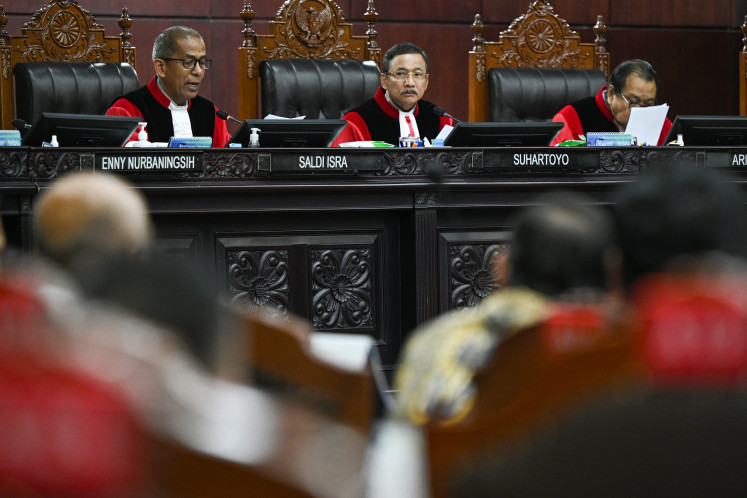Popular Reads
Top Results
Can't find what you're looking for?
View all search resultsPopular Reads
Top Results
Can't find what you're looking for?
View all search resultsRupiah rebound short-lived, say analysts
The rebound in the rupiah over the past several days would likely be temporary, as the local foreign exchange (FX) market remained volatile, financial experts have said
Change text size
Gift Premium Articles
to Anyone
T
he rebound in the rupiah over the past several days would likely be temporary, as the local foreign exchange (FX) market remained volatile, financial experts have said.
Moody's Analytics economist Faraz Syed said that a small rebound was expected due to the fact that exchange rates tend to overshoot or undershoot. But, he argued that the surge in the Indonesian currency stemmed more from global developments than favorable domestic factors.
'[The] timeline of US monetary policy normalization has been pushed back to December, so we've seen some Asian currencies hold steady against the [US] dollar. It's unlikely that the rupiah will continue to regain its losses from earlier in the year,' he wrote in an email.
The rupiah rose by an average 8.4 percent throughout last week to end at 13,411 per dollar on Friday. It was its strongest weekly gain since 2001 as Indonesia benefited from rallying share markets, as shown by data from Bloomberg.
The currency has so far appreciated by 8.7 percent against the greenback since Oct. 1, but is still weaker than at the beginning of the year, when it stood at 12,545 per US dollar.
As reported earlier, minutes from the US Federal Reserve's September meeting sparked speculation that it would delay jacking up its key policy rate until late this year or early next year.
Faraz said that the recent appreciation had not changed Moody's medium-term view that the rupiah was still on a downward trend.
'US monetary policy will normalize, and we expect capital outflows to increase. Indonesia is among the most vulnerable in Asia; foreign exchange reserves remain low compared to other ASEAN economies,' he added.
Indonesia's FX reserves stood at US$101.7 billion at the end of September, while those of Singapore, Thailand, Malaysia and the Philippines amounted to $251.64 billion, $155.53 billion, $93.3 billion and $80.31 billion, respectively.
Even though the figure has been falling since February, Bank Indonesia (BI) claims that the FX reserves are sufficient to fund seven months of imports or 6.8 months of imports and repayment of the government's offshore borrowings.
Standard & Poor's (S&P) also believes that the weakening trend will continue for the rupiah, even though it has strengthened against the dollar for the past week.
S&P economist Vincent Conti attributed the depreciation to the policy normalization in the US and the rupiah's link to commodities.
'With the forthcoming policy normalization by the Fed, the market is trying to figure out how to move forward once the process begins and it will impact emerging markets' currencies,' he said in a telephone interview.
'The other negative factor is the rupiah as a commodity currency. That kind of currency at the moment is the most susceptible to market volatility, because of the perceived link of commodities to China, despite the fact that Indonesia is not by itself largely exposed to China,' Conti added.
A similar argument was voiced by Sean Yokota, the head of Asian strategy at Skandinaviska Enskilda Banken (SEB) AB. According to Yokota, the current situation would last until the Fed hike was back on the market's mind.
'We still think it's December, and in that scenario by early December's payroll report, the dollar will start strengthening again,' he told The Jakarta Post.
'The bottom line is that investors will continue to be nervous until we get a signal from the Fed that rate hikes are off the table or we get the first rate hike out of the way. The uncertainty will continue to keep investors nervous and prevent jumping back into IDR [rupiah] assets with both feet,' he added.










